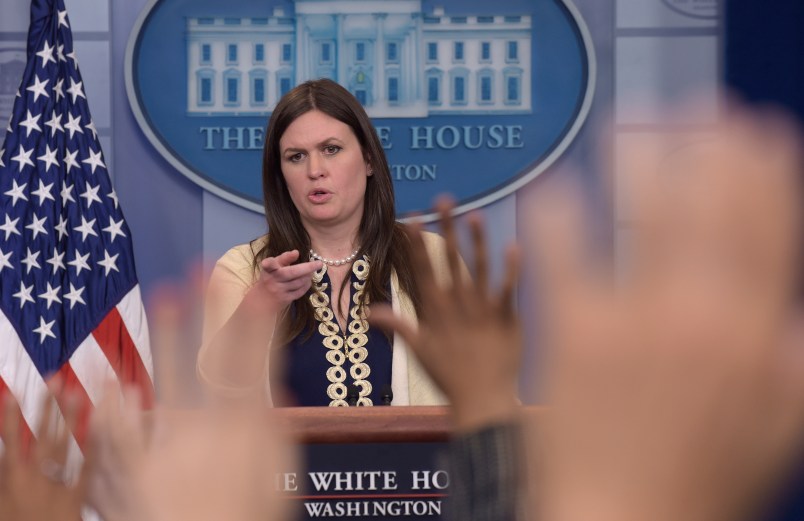The White House on Wednesday outlined additional reasons for President Donald Trump’s shock termination of former FBI Director James Comey, who led the bureau’s investigation into possible connections between Trump’s campaign and Russian election meddling, after a chaotic night and morning of backlash and mixed messages.
White House deputy press secretary Sarah Sanders faced reporters on Wednesday for the first daily White House press briefing after Trump’s abrupt firing of Comey, where she drew on the former director’s testimony last week before the Senate Judiciary Committee to explain his termination.
“I think one of the big catalysts that we saw was last week on Wednesday,” Sanders said. “Director Comey made a pretty startling revelation that he had essentially taken a stick of dynamite and thrown it into the Department of Justice by going around the chain of command when he decided to take steps without talking to the attorney general or the deputy attorney general.”
Sanders cited Comey’s decision to hold a surprise press conference in July 2016 announcing that he would not recommend charges against Hillary Clinton for her use of a private email server.
“He would not let them know what he was going to say, and that is simply not allowed,” she said.
Deputy Attorney General Rod Rosenstein, in a memo on Tuesday, accused Comey of causing “substantial damage” to the FBI’s “reputation and credibility” through his handling of the investigation.
The White House cited “clear recommendations” from Rosenstein and Attorney General Jeff Sessions in its statement Tuesday on Comey’s termination, though Trump at times praised Comey’s work on the probe.
According to several reports on Tuesday, Trump’s administration spent at least a week before Comey’s termination looking for a reason to fire him.
Sanders on Wednesday gave those reports some credence by saying that Comey was on thin ice since the day Trump won the 2016 election, though Trump was vocal with his support for Comey just days after his inauguration in January.
As another reason for Comey’s firing, Sanders pointed to his inaccurate testimony before the Senate panel about “hundreds and thousands” of emails he incorrectly claimed top Clinton aide Huma Abedin forwarded to her husband, Anthony Weiner. The FBI sent Congress a letter on Tuesday correcting Comey’s testimony just 30 minutes before Trump fired him.
“That, along with the corrections that had to take place over the last 48 hours, those are all big problems and another, I think, kind of final piece that pushed the President to make the decision that he did,” Sanders said.
She also suggested that rampant leaking from sources within the FBI contributed to Comey falling out of favor with Trump.
“How important was the FBI director’s failure to stop the leaks coming out of the FBI to the President?” Breitbart reporter Charlie Spiering asked.
“I think that’s probably one of the many factors,” Sanders said. “I think that was just another one of the many reasons that he no longer had the confidence of the President or the rest of the FBI.”
The White House’s response to backlash over Comey’s firing was uncertain at best, and Trump’s administration appeared surprised at — and unprepared for — the criticism it received from Republicans and Democrats alike over the decision.
Trump himself stepped in to explain the White House’s decision-making process, though his remarks did little to clear up the conflicts between his administration’s narrative and press reports about Comey’s firing. He defended Comey’s termination in one of his signature early morning tweetstorms and told reporters only that the former director “was not doing a good job.”
“Can we expect more firings from the Justice Department?” Spiering asked Sanders on Wednesday.
“Not that I’m aware of today,” Sanders replied, to laughter from reporters perhaps recalling White House press secretary Sean Spicer’s comment on Tuesday that Trump retained confidence in Comey.
Spicer missed Wednesday’s briefing in favor of U.S. Navy Reserve duty.










